Happy Black Friday,
Allow me to introduce you to my friend Sylvie, who is spending this fall with her parents and two sisters in Kathmandu, where she celebrated her 11th birthday last week.
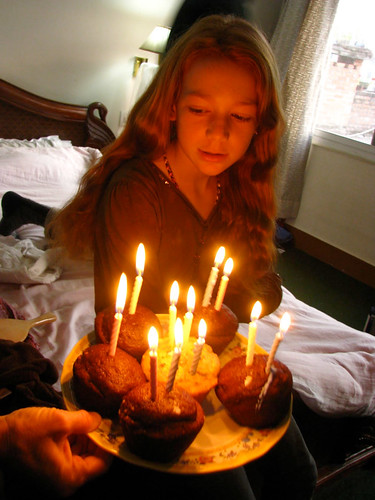
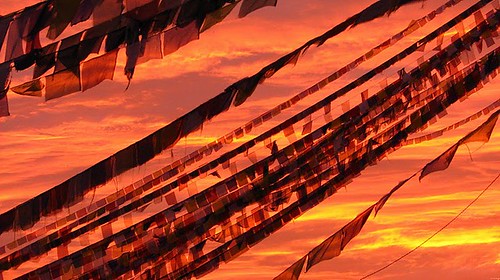
Here’s how she got there:
We’re taking our family back to South Asia for a Fall Semester Sabbatical! Ever since our 2007 Fulbright semester in India, we’ve been saving up and planning for our return. We will enroll our own daughters, and teach at Manasarovar Academy, a charity school in Kathmandu serving children of Tibetan refugee families. Paul was granted unpaid leave from his teaching job, and Karen departed one month early from her summer park ranger position.
Their blog is worth checking out in its entirety, for inspiration on how a family of very modest means can offer their kids amazing experiences and opportunities.
I’d like to share the story of how sometimes the greatest gift can be to free a bird.
 Paul, Sylvie’s Dad, explains that they always try to do something extra special for her, as her birthday has found the family overseas several times, spending more of Sylvie’ birthdays away from home than not. (“Lucky!” says her dad, or unlucky, as she sometimes complains.)
Paul, Sylvie’s Dad, explains that they always try to do something extra special for her, as her birthday has found the family overseas several times, spending more of Sylvie’ birthdays away from home than not. (“Lucky!” says her dad, or unlucky, as she sometimes complains.)
“She’s rarely wanted a lot of ‘things,’ preferring adventures or experiences over more ‘stuff’ to clutter up her room,” says Paul.
This year was no different: It started with a round of cards and muffins with friends a couple of weeks ago, followed by candles, breakfast goodies, and a visit to Kathmandu’s one climbing wall on her “real” birthday. A fine meal at Fire & Ice, her favorite pizza place in Nepal, rounded out the evening.
But there was something else Sylvie was itching for, a gift involving the “bird sellers” that often wander their neighborhood with 10 or 15 small cages, filled to the gills with parakeets. As Paul explains, these birds are for sale as caged pets, but also are marketed as a way to boost your “karma points” by buying their freedom & releasing them. “It’s a twisted industry: The bird dealers will sell their prisoners, then head back down to the Terai (flatlands) to trap more birds. Bring ’em to Kathmandu, sell them to Buddhists to release, go back to the forest and trap some more…”
But Sylvie had one big wish for the year…


What’s so cool about this non-material wish is that it doesn’t have a Disneyesque fairy tale good vs evil sort of narrative but comes loaded with the full complexities and paradoxes of life and the relationship between human and non-human species on planet Earth. If we’re really serious about turning the corner towards creating a more sustainable world, the following is the kind of dialog with our younger cohabitants we need to have:
We had endless discussions about releasing non-native birds in the wrong habitat, and the concerns that these caged birds might not survive in the wild. We considered if buying these birds would only encourage more trapping of wild birds. We thought about the morality of spending a large chunk of money to free a bird, when there are starving and disfigured human beggars right down the street…
Talk about a gift that keeps on giving! Don’t get me wrong, I certainly think that any “thing” type of gift carries with it the same potential for greater learning and understanding, the thing behind the thing. There’s certainly a big convoluted story behind every toy and gadget, and imagine our world if we had more conversations about the life journey and side effects of the things we buy. But somehow there’s something big and true and sublime and simple about just wanting to let birds fly.
As Paul writes…
But in the end, I had to put away my logical thinking, and listen to and learn from my daughter. She said, “so what if they don’t live such a long time, or if they might get trapped again. If they die in just a day or two, at least they’ll die free, living in a tree somewhere. Any amount of life flying free has to be better than suffering in those tiny cages!”
And so Sylvie’s wish was granted. Her parents flagged down a “bird man,” and, after carefully inspecting and speaking with all the birds in the many cages, she decided to release a pair of parakeets.
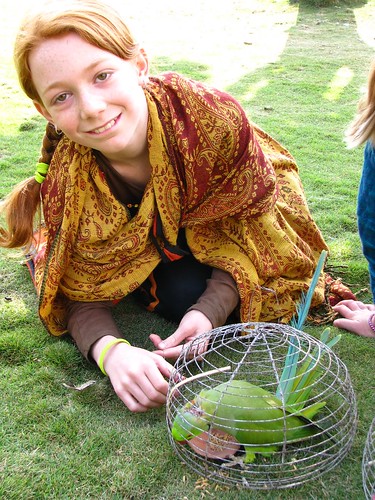
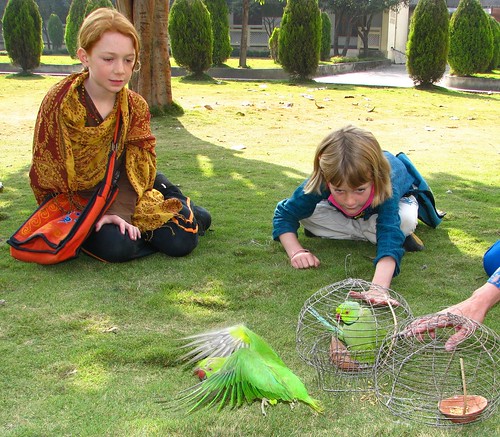
Sylvie’s gift may not be of huge significance in the annals of politics, war and peace, or climate change, and it may or may not have improved the lot of these birds, the vendor, or the Nepalese ecosystem. But to see an 11-year old derive such joy from such a small and simple act gives me hope, because it evokes something bigger than the sum of all tangible results: our human capacity to find meaning in the spaces between, to discover largeness in small things, and to have empathy for all living creatures on this beautiful neck of the galaxy we find ourselves in.
“Watching those emerald green birds flying free was a wonderful joyful moment for all of our girls,” says Paul. And Sylvie summed it up quite nicely:
“Thanks Mom & Dad!!! That was the Best BEST Birthday Present EVER!!!”
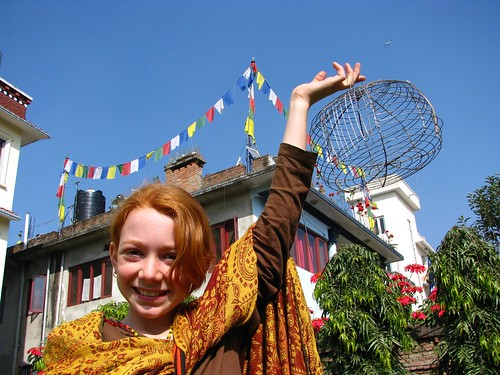








Great post Sven! Porter (8) liked it too! What a cool kid!
I think Porter would love to hang out with the Amstutz girls. Good people. And I hope to meet Porter one of these days. Hope you’re having a wonderful holiday weekend, Cori!
As if spiritual materialism was not just another consumerism with a “good conscious” label .
Now, let s reflect one instant how much gasoline got used for this little travel per person, and how much habitat of the bird wood gets used for a certain tourist ( oh not tourist, do gooders!) comfort in that region, just for let say…warm showers.
As long some buy those birds out they will be put in cages..logic!
I wished the middle class would start to think her own little trips philosophically(and ecologically!) trough. I am so tired of all this half way thinking!
you’re making some valid points, antiphonsgarden, and as you read in the blog post, the parents had the same concerns about the birds. They obviously realized all the problems associated with this and they personally think it’s messed up, so they used this situation to talk to their children about all these problems.
I’m not sure what you mean by “spiritual materialism” and how it applies to this story. Also, I don’t see any “good conscious label” (did you mean to say “conscience?”) anywhere, but maybe I’m not seeing what you’re seeing. To me, it’s about an 11-year old who wants to set a bird free for her birthday, which seems to be very non-materialistic to me. If she grows up to be an adult who finds more joy in the little things in life rather than another blind consumer, and perhaps inspires others to do so too, then that’ll be of benefit for the future of this planet, wouldn’t you say so?
You’re right, traveling by plane takes a lot of gasoline and releases CO2. But they’re not on a “little” trip. They’re there for 6 months and the father is teaching at a local school. They’re making friends and lifelong connections with many people, so it’s not like they’re just over there to get a few snapshots and feelgood memories.
As far as warm showers, being good friends with this family I know they’re living exactly the way locals live in Kathmandu, so if the average resident of Kathmandu doesn’t have a warm shower then they don’t either.
I understand that the best solutions for the ecological crisis we find ourselves in are found locally. But I also think that we have to keep learning from each other and that living in another culture is one of the best ways to do that. So I think in that respect this is a great example of how to travel but make your carbon footprint really count for something. Rather than just flying somewhere for a couple of weeks to look at sights or go on a trek, this family is taking the time to learn local customs and language, contributing to the local schools by being teachers, and giving their children the opportunity to become tolerant and culturally-sensitive American citizens. If that’s what you — seemingly cynically — call “do gooders,” that’s fine with me. I have no problem with people trying to do good. What’s your alternative — “do worsers?”
Considering the poverty in some places of the U.S.A. (who is not all America, so I guessed their origin’s!), plenty can be done in less exotic situations.
I agree with you that travelling increases the inner space of perception somewhere, I am just questioning sometimes the ethnological puerility of some middle class who might consider Asian destinations as so much more spiritual as “at home”( A nepal friend of mine from Kathmandu finds that very amusing!), neglecting all the feudal patterns, amongst other dehumanising aspects…of the religious or societal situations.
I don’t think that cultural angelism is doing any good, it simply perpetuates clichés.
By the way, parents can use a magic word :”no!” , they might explain.
You’re right, some people look at certain Asian countries as places where “enlightenment” can be found, and I would agree with you that in many cases this can be a misguided search. And yes, you can find meaning or enlightenment or god or whatever you want to call it right where you are. But I also think that your criticism as it relates to this story is misplaced, as there is no mention anywhere that they’re on some sort of a spiritual or religious quest. They just enjoy the cultural exchange and exploring life in another, very beautiful country, and I think they’ve had some really great experiences with the Nepalese people and made a lot of good friends. If that’s bad for the planet or philosophically wrong in your view, so be it. Life and humans are complex, and everyone has a different way of searching for and expressing their heart and soul.
It’s true that there is plenty to be done in the USA (what should I call people who are from the USA if calling them “Americans” is not acceptable — USAians?), and they are teachers, so they are doing a lot to make sure the next generation of children will have an education. But if we go by your logic, then nobody should ever be allowed to travel anywhere. That, in my opinion, would make the world a sad place to live in. And telling people they can’t travel would probably make Europeans the most unhappy of them all, as I can tell you from my own experience that my German compatriots are found everywhere, in the most distant and exotic corners of the planet.
And sure, parents can say no and they often do. In this case, saying yes brought huge heartfelt joy to an 11-year old. It was a decision made after careful deliberation. Perhaps not perfect, but we all have to make imperfect decision in our lives on Earth all the time. In that moment, it felt like the right one.
Well, I thank you for your response, and I might have sound a bit harsh,…But I come to a point where I have enough of all the little “nice”half thoughts on this poor planet . Allow me to be a bit tired after decades of seeing the heavy things coming our way, and observing the too slow response from a society “busy elsewhere”. I am sorry if those people act differently and got put into the same bag. I simply wished a stronger reaction in general. Not this generalised sugar coated “niceness”(nescius/ignorant) all over the mess. I hope for your understanding.thanks.
totally understand your frustrations, antiphonsgarden. We need big, drastic structural changes in this world, and whatever is happening in that direction is happening too slowly. It’s weird, on the one hand we need more righteous anger to bring down those rich and powerful few who benefit the most from the unsustainable systems, and on the other we also have to also try to be more kind to each other, so we don’t forget what the world we WANT to live in should look like. To use a musical metaphor, we need to be both punks and hippies, tear things down while we’re also building new things up. So, I really understand where you are coming from, and I appreciate your perspective and this dialog very much, it’s important and perhaps reflects the dialog we need to have on a bigger stage and more often. All we individuals can do is sow seeds, and I think both you and I are doing very well with that. So thank you for taking the time to check in here and helping me to stretch my thinking. That may be too nice a thing to say, but it’s heartfelt… I truly mean it 😉
I am great full for your generosity in our communication. I agree with you too.
I am mostly hopeful as I think the natural and the truth(I know big words, but I mean them more as energetic quality’s, not moralin ones!) makes it on the long run to the surface. After a life of “care”in all forms, for myself (important !), for the environment, for my mother who had Alzheimer, from “normal” neuroses to more intense social needs, I can only say my love for humans is deeply rooted and still blooming. Out of this love some impatience arise in the last, maybe because I feel the struggle between both forces coming to a crucial turning point. More aware citizen demanding more mature responsibility observing the greed and disastrous power games of few, but also something each therapist knows..the resistance to change truly the parameters. I have seen how the reactionary backlash has denigrated the spirit of freedom of a certain time with disdain, …this nightmare is systematic. With friendly greetings from an old hippie punk who trust the human nature to make sense with the senses, and knows that even neurologically our surviving optimum, was, is and will be compassion.
😉
Thanks to both Sven and antiphonsgarden for taking this conversation beyond the already insightful blog post. You provided a great lesson in moving past seeming differences in the ether. My best to you both.
Thank you Barbara for sharing this situation. I have enjoy our mutual willingness to understand each other too.Merci Swen, for making it possible.
Sorry, Sven!…for my dyslexic change of v to w !) A name should be well named!
Yes, merci beaucoup indeed! To antiphonsgarden for putting all your care and energy into moving a great conversation forward, and to Barbara for witnessing and contributing such a fitting summary.
A bientot!
PS: no worries about my name, I’ve been called much worse 😉
Sven, I noticed that good willing people understand the deeper sense of my sometimes “creative” dyslexic English quiet well, during those who dislike what I have to say, jump on the occasion to denigrate me as unworthy contributor due to my lousy grammar. Good way to find out who needs disdainful divisive mannerism to remain “in control” and those who s heart is inclusive of differences.Glad, you belong to those last ones.
antiphonsgarden, I don’t know why people get so mean on the internet but I guess it’s the anonymity. Language is a beautiful tool, in all its different forms and manifestations. Anyone who learns another language besides their mother tongue in my eyes is a human ambassador for understanding. As a native German speaker, English is not my first language either, and while I don’t have much of an accent after 23 years in the USA, I sometimes wish I still did. Accents are fun, interesting, and make us unique. And grammar is overrated, anyway. 😉
I agree with you that grammar is overrated. I go even further…those “golden wrapped paper spell star”some seems to wear with pride are the sign of a poor education. It is less costly to “educate” children into such competitive affectations, as to provide good teachers helping them to develop their inner ability to question the inner sense with curiosity. I raised up in a multiple language household, went to an international school and consider myself first a human amongst human from the same shared earth.
Just one thought about the mean attitude on the internet. I think paradoxically it is the partly the result of the disastrous mannerism of the nanny netiquette delusion who makes it possible to territory control freaks to call everybody a troll who think further than their own mental limitation.
I have often experience the mobbing tribal games of “exclusion” and witch hunting such a description of the communication reality provides.The way to hell is paved with “good intentions” and we know how such finger pointing towards the bad outsider up to the instrumentation of such words like “terrorist”,”troll”,” political incorrect”, serves the purpose of forces who s profit grows with the paranoia script.
Some are willing to “wash the mouth with soap”up to censuring each critic questioning the paradigm. History tells how scary this concept of mental “hygiene”is!
Yes, the “echo chamber” effect is a big problem on the internet, but maybe not so different from real life, either. Perhaps it’s just human nature, but it’s easier to surround yourself with people you agree with. Arguing and debate takes a lot of energy, and for a lot of people it’s hard enough just to deal with the challenges of everyday life that they don’t like to volunteer for more adversity. Once again, I’m a proponent of the middle way: It’s good to have a community of like-minded spirits, but then we also need to go out and have our own assumptions challenged from time to time, as well as challenge those of others. Change is difficult and uncomfortable, but that’s why it’s called change. You just have to pick your battles wisely, so you don’t get too jaded and beaten down. As long as you can still embody the change you wish to see in the world, you’re on the right track, and everyone needs to find for themselves how much confrontation they can handle without losing their ability to envision a better, kinder, and more conscious world.
I think it is partly a cultural thing too. In France people love to argue intellectually strongly with each other, and after that they go together for a good meal.It s just another delight of life! During in the USA it is often a matter of dominance where everything is allowed to subordinate the not “co smiler”(Cheeese!), and other Anglo-Saxon country’s of appearing smart through cynicism. Not everybody, but a tendency in “conflicts”.
Have you heard about the work of Ruth Cohn, who worked about the right balance” of topic, group, and individual.She just comes to my mind talking about “how much engagement in conflictual situation”.
I come from a long line of stubborn people, who said strongly what they have to say,long before the mainstream “followed”, and had a mother who fought in the Resistance and smuggled people with her cousins over the mountains. I highly doubt that sticking to the “middle way” is the safest for humanity. I suggest more to care about the neglect shadows in time to make the path possible to walk for the weakest feet.
heh, would love to sit around the dinner table with you stubborn people some day, sounds like it would make for very interesting debate, and I’m sure, great food! : )
I’ve heard about Ruth Cohn, but haven’t read any of her work. I’ll put it on my list.
Any time, Sven!
Her work is worth to be noticed,
I liked her as human even more.